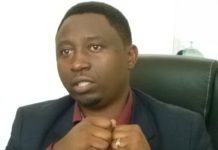2013 is ending and a new year is looming. This year has revealed the nature of the regime that oppresses the Rwandan people since 1994 : a Tutsi supremacist autocracy. The nature of this regime was exposed when the Rwandan tyrant made it clear that « every Hutu should apologize for the crime of genocide because it was committed in their name » ! 2014 shall be a special year in many ways. Children born in 94 will be twenty, an age in which every human being enters adulthood. Clearly, the firtst post-genocide generation will be fully ready to enter active life.
2014 will also be a crucial year for the ruling clique. It will be confronted with a new generation of Rwandans born under its ruthless rule. This generation’s unquenchable thirst for freedom won’t subside. And this trend will continue for the years to come. In spite of its numerous means of repression, the supremacist autocracy won’t stop that search of and march to freedom. Even its new strategy of globalization of guilt by association which forms the core of the infamous « Ndi Umunyarwanda » campaign won’t reverse that trend. And the next generation will be even more aggressive and less patient. Whether the supremacist autocracy wishes it or not, at last, the people shall govern. But to attain that goal, Rwandans need to clearly define what the fundamental problem is and how to resolve it.
Rwanda’s major problem
What is Rwanda’s major problem ? To many Rwandans and even remote observers, Rwanda’s major problem is ethnic exclusion. This is a recurrent problem.
During the pre-colonial and colonial eras, a small minority of Tutsis from the Banyiginya, Bakono, Bega and Baha clans conquered, oppressed and exploited a huge majority of Hutus whatever class they belonged to. This system of oppression and exploitation lasted 400 years all the way from the feudal regime through colonial regime mainly via two exploitation systems «ubuhake » ( selfdom) and « uburetwa » (forced labor).
Between the 1959 petty bourgeois and peasant Hutu revolution and 1994, all the way through the first and second republics, Tutsis from all classes were also politically and socially excluded with a peak that led to the 1994 genocide. The culprits are some Hutu petty bourgeois during the « first republic » and then the Hutu bureaucratic bourgeoisie during the « second republic ». These two regimes could be characterized as Hutu populist regimes.
Since July 1994, a Tutsi supremacist and militarist clique led by Paul Kagame has hijacked the State by force and imposed itself upon the Rwandan nation and people. It rules by brutal use of force in a manner that has never been experienced in Rwanda’s multisecular history. And for the second time in Rwanda’s history, Hutus are collectively treated as outcasts and are collectively culturally, politically, socially and economically segregated. For obvious reasons, this exclusion has never been openly acknowledged and is even strongly denied by the ruling autocrat and his agents.
The first major problem that Rwanda has to face is ethnic segregation. The expression of ‘ethnic group’ is vehemently dismissed by the ruling supremacist clique. It even claims that Hutu, Tutsi and Twa categories were social classes. This is pure propaganda. A short analysis of Rwanda’s historical formations shows that like in any other society, Rwanda’s social structure responds to the classic social cleavages that characterize the social formations it went through, namely the primitive community, the feudal, the colonial and neocolonial regimes. There was a term equivalent to slavery (ubuja) in ancient Rwanda. This means that Rwandans knew that mode of production to the extent that it even persisted during the feudal regime. Serfs would call their masters « data-buja », litterally « father-in-slavery ». New social classes emerged during the colonial and neocolonial regimes as consequences of the expression of capitalism in its periphery when Rwanda was integrated into the capitalist system after the Berlin Conference. So, clearly Hutu, Tutsi and Twa are not social classes.
The common characteristic of all those regimes, whether the ruling clique hails from the Tutsi minority or the Hutu majority is that they practiced ethnic exclusion in various forms : Hutu populism or Tutsi supremacism. Additionnally and unsurprisingly, none of them was a democracy. During the pre-colonial era, the Rwandan rule was an absolute Tutsi monarchy. The monarch’s powers were limited by the colonialists during the colonial rule but oppression worsened. Apart from short periods of multiparty activism first from 1959 to 1963 and then between 1991 and 1994, during the Hutu populist regimes, autocracy has always been and is still the order of the day.
In conclusion, the major problem of Rwanda is ethnic dictatorship. The present ethnic dictatorship is a Tutsi supremacist autocracy. Hutus are excluded and despised but Tutsis are not free either. To uproot it we need to know where the autocracy’s power comes from.
Whence comes Rwanda’s ethnic dictatorship’s power ?
According to Gene Sharp (author of ‘From Dictatorship to Democracy’), the major sources of power are authority, control of human and material resources, skills and knowledge, ability to administer sanctions or punishment and lastly certain intangible factors. In the case of present Rwanda, there is a belief among Tutsis in Rwanda that the regime is legitimate and that they must obey it. That legitimacy is constructed around the idea that the autocratic regime « stopped the genocide » and « guarantees that another genocide won’t happen » in the future. Another source of power that this regime exploits to the maximum is the belief that many Tutsis still think that they have to obey and assist the ruling clique for the sake of preventing that « Hutus don’t get to power again » which would give them the power to exclude or even exterminate them again.
That’s why a great number of Tutsis obey, cooperate and provide assistance to the ruling supremacist clique. That’s also why they supply the skills and knowledge needed by the supremacist autocracy to perform all the required tasks that allow its preservation and/or consolidation. It is these skills and knowledge together with the human and material resources given to the ruling clique that enable it to develop Tutsi-based armed forces, police, intelligence, courts of law and prisons that are utilized by the ruling clique to threaten or apply punishments or sanctions against desobedient Tutsis and non-cooperative Hutus to ensure cooperation (of Tutsis) and submission (from Hutus) that are needed for the regime to exist and carry out its policies.
The People Shall Govern
Most of the sources of power of Rwanda’s supramacist autocracy stem from beliefs linked to the 1994 genocide. Those beliefs are perpetuated by various techniques including « ingando » (indoctrination camps for the youth especially students) and « amatorero y’igihugu » (indoctrination sessions for all citizens). The main tool used to promote the regime legitimacy is the myth that the current regime « ended the genocide against the Tutsis» and « prevents its recurrence ». The new generation of Rwandans born in 1994 doesn’t respond to the general psychological mindset that is required for such a tool to be effected and to be efficient. The reason is that they don’t bear any memory of the events that are used to construct those beliefs. This generation that is linked to the world by new information and communication technologies like internet and social media aspires first and foremost to freedom and secondly to shared prosperity.
It’s going to be more and more difficult for the autocratic regime to justify limitation of freedom for Tutsis. It’s going to be more and more difficult for the autocratic regime to impose submission to Hutu youths by the use of courts and prisons for « participation in genocide » or even « harboring the genocide ideology ». The newly found tool of control of minds aimed at instilling into their minds the feeling of guilty by association because of « the crime of genocide committed in their name » will not work either. They just can’t understand why they should be held accountable of crimes committed before they were even born. Young Tutsis will not understand why they don’t enjoy freedom, in this time and era.
For those two reasons, exclusion of Hutus shall be unacceptable for this generation whereas young Tutsis born in or after 1994 won’t accept to be denied basic freedoms in the name of « preventing Hutus from capturing power and finish the job ». The last general population census held in 2012 showed that more than 50% of the Rwandan population was below 20 years. By 2017, the total number of Rwandans born in and after 1994 will reach 60%, roughly 7 million.
That’s why 2014 is a turning point. That’s why there’s hope for a new Rwanda. With no doubt, the confrontation between the status quo and the aspirations of the Rwandan people for inclusion and freedom will lead to change. That’s what FDU-Inkingi leadership stands for. We don’t fight Paul Kagame as such. It would be both narrow and futile. We fight an unacceptable and recurrent political system that is based on ethnic exclusion and denial of civil liberties. We fight the current regime because it is sectarian and dictatorial. We fight a supramacist and dictatorial regime.
And whether they like it or not, the supremacist dictatorship will fall and the people shall govern. What they avoid, the principle ‘one man, one vote’ shall prevail and there shall be a majority rule, non ethnic and democratic, whether they like it or not. And we don’t have to apologize for that.
Brussels, 27 December 2013
Dr Jean-Baptiste Mberabahizi































































